Surf’s up: how one man’s surfing school is saving veterans’ lives
With the healing powers of the ocean and the support of like-minded mates, a former big-wave surfer is bringing military veterans and first responders back from the brink.
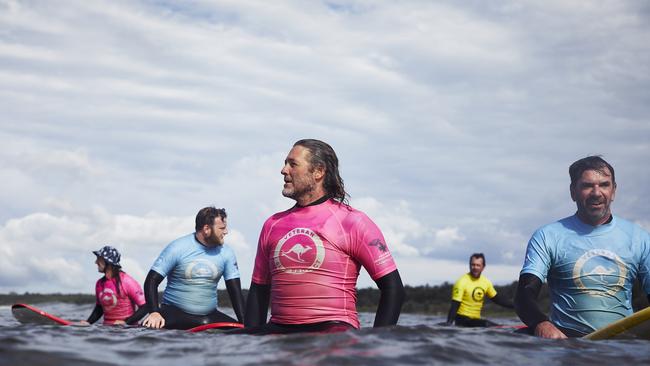
Tony Pearce is living proof of the transformative power of surfing. Every Saturday morning, the 52-year-old army veteran drives for two hours to the NSW South Coast in his work van, which he’s kitted out with a bed and a surfboard rack and, on the dashboard, some healing crystals.
Within minutes of arriving at Seven Mile Beach, “Big Tony”, as he is known, has changed into his wetsuit, grabbed his new fibreglass board and is out in the sea with a group of other surfers, catching the long rollers the beach is famous for. When the bigger waves throw them off, they dive under before resurfacing and letting out a few whoops of joy. Within seconds, they have clambered onto their boards again and are paddling back out into the onrushing foam. There’s no way they will miss a precious moment of this weekly saltwater fix.
“I can’t believe I’ve been missing out on this for so long,” Tony says as he emerges from the sea with a huge smile on his broad face. “We call it stealth therapy because it creeps up and heals you while you’re out having fun. The first wave I caught was better than my first line of speed.”
It may seem hard to believe but just a few years earlier, the former Australian Defence Force engineer’s world had become very dark. Like countless other veterans, Tony had found himself homeless, unemployed and addicted to ice and amphetamines. The addiction, he says, led to him “losing everything I had, everyone I loved”.
He reached rock bottom when he was involved in a police chase that led to him sitting on the side of the road in handcuffs. “I realised if I kept going, I was going to end up either in jail or dead.”
The secret to his recovery was the Veteran Surf Project, a learn-to-surf school for military veterans and first responders with post-traumatic stress disorder and depression. The man behind it is former big wave surfer Rusty Moran, who noticed something remarkable when he set up his surf school near the small coastal town of Gerroa in 2017. Within a couple of months of weekly surfing lessons, some of his students, particularly defence force personnel from the nearby naval base, reported that they had started to recover from the debilitating disorder.
“I was teaching a group of local doctors who came surfing to de-stress from their work,” Rusty recalls. “One GP said she wished she could write a script for 10 surf lessons for her patients instead of medication. So I thought, well, why not? Why don’t I make this happen?”
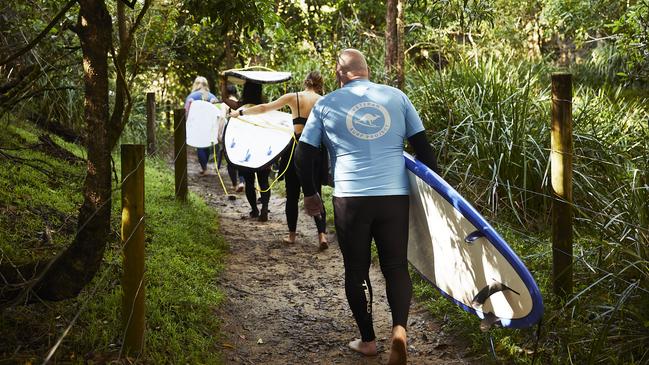
A few years later, the Veteran Surf Project came into being and, in January 2021, Rusty began introducing veterans and first responders with PTSD to the great tonic of surfing.
“Surfing puts us into a flow state, because when we get on the wave we’ve got about five or 10 seconds when we’re fully focused and in the present moment, thinking of nothing else but being on that wave. It’s meditative. Even just for a brief moment, but each moment accumulates over time. It rewires the brain eventually.”
Rusty slowly paddles out on his board, his salt-laden, shoulder-length hair slicked back off his face so he can keep a close watch over his students. “Soldiers are trained the same way as surfers – to learn the skill set, then wait patiently and then burst into action, and get that big adrenaline hit. This similarity makes it a natural process for soldiers to tap into the healing benefits of surfing, and the ocean.”
Rusty has helped hundreds of students, including many first responders. One – known simply as “Ankles”, for the ankle monitor tucked discreetly under his wetsuit – credits Rusty’s program for his freedom. When the former NSW police officer was charged with assault, resulting from cocaine abuse, he expected to be sentenced to prison for 18 months. Instead, the judge was so impressed by the psychiatric report about his recovery within Rusty’s program that he made specific orders for him to attend twice a week.
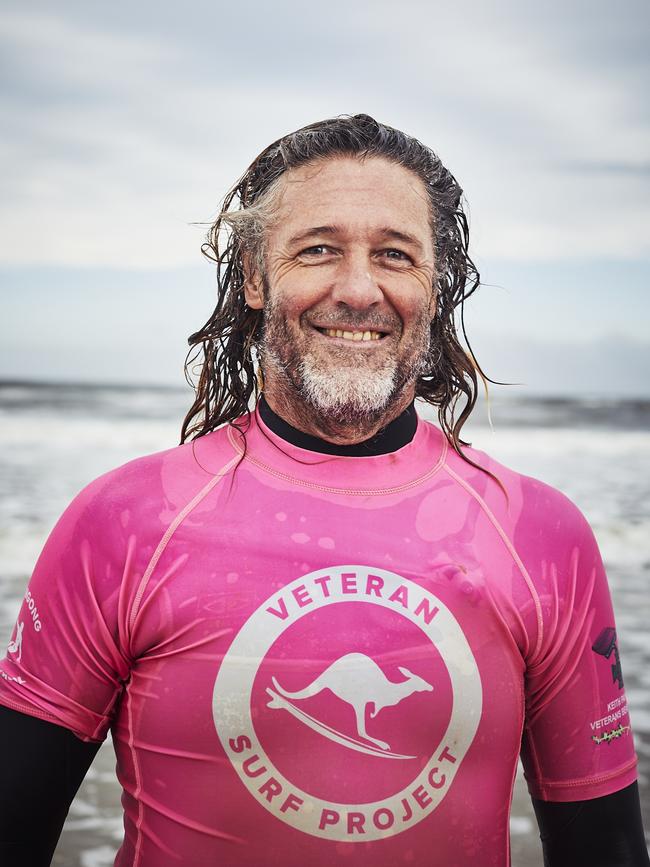
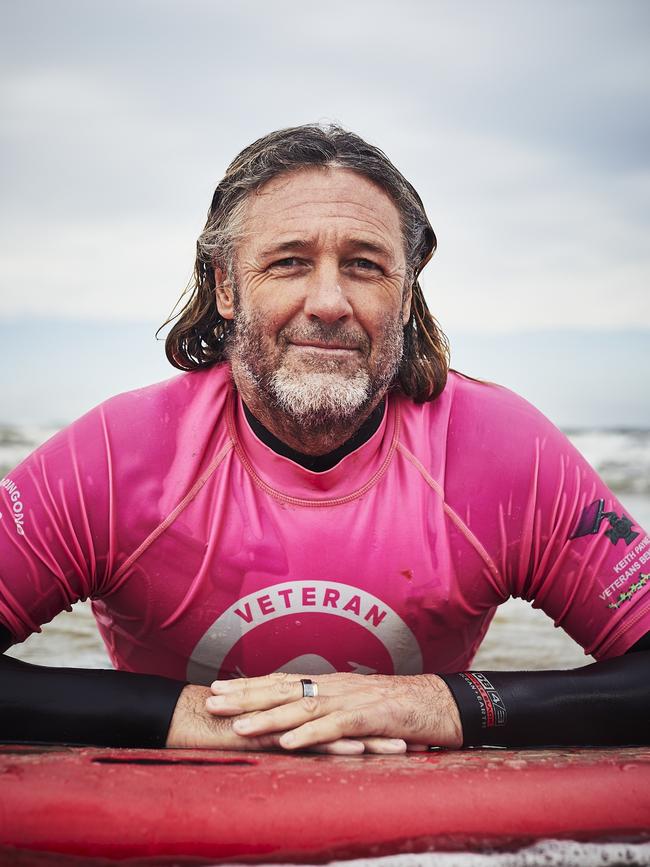
Rusty was 19 when he began taking on the outer reefs of Hawaii with the likes of Ken Bradshaw and Mark Foo. It was the early 1990s and they were paid by sponsors to ride the world’s biggest waves. They were the mavericks of the surfing world and thought they were immortal, tackling monster swells, often a kilometre or two from shore. This was in the days before competitive surfers had jet skis hovering close by in case anything went wrong. But then one day, things did go badly wrong.
Rusty was surfing next to Hawaiian big wave surfer Jim Broach when a giant set of waves – each the size of a five storey building – broke right in front of them. “Each time I surfaced, I looked for Jim, but he was gone … I couldn’t see him at all.”
Three other surfing friends died that year. Rusty’s turning point came a few months later, at the funeral of Mark Foo. “Mark’s friends were saying, ‘Well, he died doing what he loved’, and I suddenly realised how crazy it was, what we were doing. I loved surfing, but I wasn’t prepared to die doing it.”
He flew home, proposed to his girlfriend, started a family, became a civil engineer, then a property developer, and finally worked out how to make a living doing what he most loved – teaching others to surf.
The backbone of the Veteran Surf Project is connecting with nature. “Just having sand under their toes and feeling the warm sun on their faces is therapeutic in itself,” Rusty says. “Then throw in the adrenaline rush of the waves, and the physical workout and the camaraderie, and you’ve got something that really works.”
Stopping to reflect and savour each surf as a group is equally important. “If you’ve ever noticed surfers after a surf, we like to loiter in the car park, trying to extend that refreshed feeling a little longer.” Rusty laughs.
Tony’s take on it is this: “For the first time, I don’t have to pretend to be anything other than what I am. VSP is like having instant brothers and sisters. We realised we are part of something bigger than ourselves, and that feels damn good.”
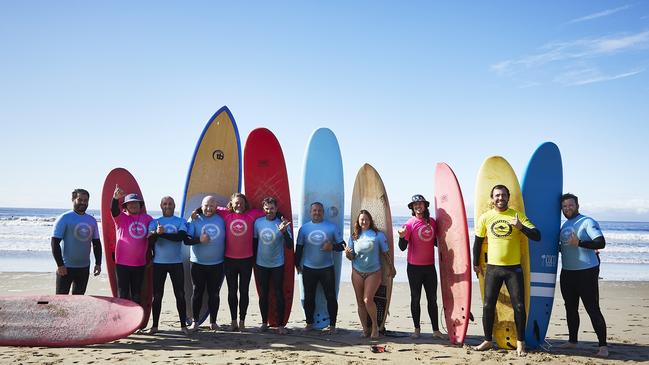
Tony was only 17 when he joined the Australian Defence Force. He was proud of what he did – supporting frontline troops by building bridges and laying pipes for their water supply – but when he left, life came crashing down around him. Without the bonds of friendship he’d forged within the ADF, and without the safety net of a structured hierarchy and daily routine, he found himself struggling to build relationships, to hold down a job, or to control his spiralling drug addiction.
The culture of the ADF made it hard for him to adjust to civilian life. “It’s about being as stoic as possible – if you cracked, or showed any kind of vulnerability, the whole group were punished. Bed bashes were common. That’s when, if you let everyone else down, they would burst into your room. You get woken up with a beating.”
And there was an enormous resistance to asking for help.
It wasn’t until Tony was standing in the lift of the South Coast Private Hospital, which specialises in psychiatric illnesses, that life finally took a turn for the better. Each time he caught the lift, his gaze was drawn to an intriguing poster on the wall. It showed a kangaroo on a surfboard inside a roundel that read Veteran Surf Project. He was curious: the symbol for the Royal Australian Air Force was a kangaroo in a roundel, but this one looked like much more fun.
At first Tony was full of doubts. “I kept thinking, I can’t do this, I don’t even have a wetsuit.” But a few weeks later, Tony found himself at Seven Mile Beach, standing knee-deep in salt water, clutching a surfboard, with a coterie of other veterans, police officers and first responders.
“Next thing I knew, a couple of these mates were pushing me onto the board and up onto a wave. It was a great moment in my life,” he remembers now. “I had absolutely nothing in my head. Just a feeling of being completely in the moment, being aware of everything around me, and listening to my own breath. It didn’t matter whether the waves were big or small, or which way the wind was blowing, I just had to get out there into it.”
During the course, Tony was able to reduce his antidepressants and anti-anxiety medication to the bare minimum. “The Veteran Surf Project is a big reason I am here today. This project literally saved my life. I was always resigned to the fact that I was going to die doing what I was doing. I thought I had no options. I wasn’t planning on doing anything productive with my life because I didn’t know I was going to be around for that long,” he says. “This is the best therapy I’ve found by far. And better than any drug I’ve taken.”
Tony sits back and looks at the cobalt-blue water around him, stretched out as far as the eye can see. “The thing about the ocean is that it will punish you if you don’t pay attention to it. When you’re in the ocean, no matter what your rank or station is in life, you are not the boss any longer. When I’m out on a wave, all the ordinary things that consume me fade away. You don’t worry so much about whether you’re rich or you’re poor. Or what you have or don’t have. Your brain slips into a different gear. You’re in the present moment, and it’s a wonderful place to be.”
The long-term effects of learning to surf have been extraordinary for Tony. Not only is he holding down a job as a hearing technician, he’s also healed the rift with his family. His voice quavers with emotion when he describes catching a wave with his 19-year-old son, or the joy it brings him being “Pop” to his three grandchildren. “What Rusty has done is provide a community for us. Of people who love the ocean. It’s helped us all get back on our feet. It’s better than any medicine you could ever find.”
What makes the program work is Rusty’s understanding of how bleak life can be for veterans. “Many are homeless. Many of them sleep under bridges,” he says. “There are more than 7000 Australian veterans sleeping rough. It’s a massive problem that hasn’t really been dealt with.”
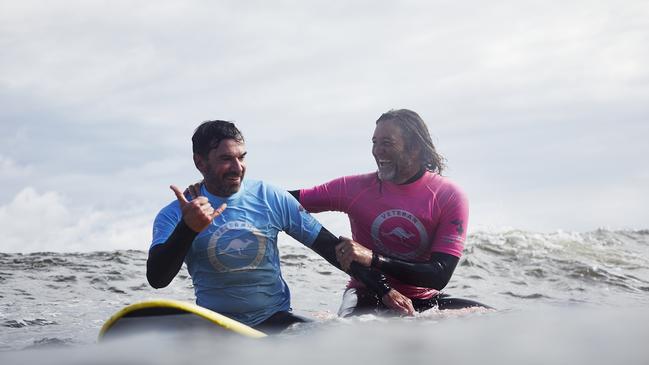
In a nearby cafe after their surf, Rusty’s care for his students is touching. It’s often here, having coffee together, that he sees the veterans’ physical signs of PTSD. “They sit with their back to the wall so they can see the entrance, and their head is turning to the left and the right, constantly scanning for bombers. It’s impossible for them to truly relax and be at ease.
“It’s an exhausting way to live, because the nervous system is stuck in fight-or-flight, and when the cortisol dries up, depression follows.”
It was no surprise to him that the Royal Commission into Defence and Veteran Suicide, launched in 2021, revealed that suicide rates for male veterans is almost 30 per cent higher than in the wider Australian male population. There were a staggering 1677 suicides between 1997 and 2021.
Rusty knows first-hand what it’s like to live with PTSD. His father was only 14 when he joined the Australian Merchant Navy and was dispatched to Papua New Guinea and the Solomon Islands during World War II. He suffered PTSD for decades and turned, as many did, to alcohol.
Rusty grew up bracing himself against sudden bursts of anger from his father. “It would come out of nowhere, just these huge rages, and leave us all reeling. I learned to be on high alert, to get out of his way. I was in fight-or-flight mode a lot of the time until Dad started going to Alcoholics Anonymous. He became an AA mentor for the last 45 years of his life and helped hundreds recover, and demonstrated the power of social support.”
One VSP participant, Derek Pyrah, found that he was left with deep emotional scars after active duty in Iraq. Derek was dispatched to the thick of the war zone in 2003, running the computer networks and cryptography. He was renowned for being lightning fast, but several months into his posting he began experiencing the debilitating symptoms of PTSD. To his despair, he found himself unable to carry out the simplest of tasks, such as setting up a user account. “I’d go to do it and then my mind was a complete blank,” he recalls.
Worse, he found himself unable to contain his rage. “I was suddenly arguing and fighting and telling my boss to get f..ked and I’ve never done anything like that in my life. Everything was going weird. Everything was falling apart.”
When he returned home, Derek was a stranger to his family and friends. “My wife and kids said to me years later that when I got off the plane it looked like me, but I didn’t talk like me or walk like me. I was always a nice, caring person. But I became irritable, angry, snappy, confused, frustrated.”
He was unable to hold down a job, and was plagued by insomnia, nightmares and flashbacks about what happened in Iraq, which he still cannot talk about. But what made matters far worse was being “pumped”, as he puts it, with a “rotating cocktail” of medications that included high doses of anticonvulsant, as well as anti-anxiety and antipsychotic medications – the heavy-duty kind used to treat schizophrenia and bipolar disorder.
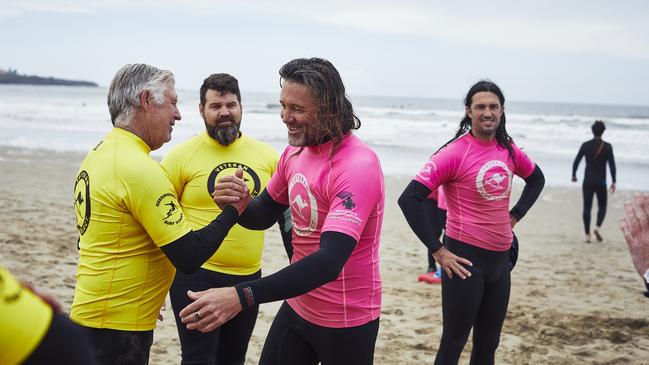
The drugs turned him into a zombie, he says, and ruined his marriage. “The psych meds were killing me. I wasn’t able to express myself. I would basically just sit in a corner and drool. And the medication made me eat and eat. I was 40kg overweight.”
Derek stayed in a mental health hospital for a third of each year for nine years.
He eventually realised that to truly take stock of what had happened to him in Iraq, and to start getting his life back, he would need to get off the prescription drugs. With remarkable determination, he began weaning off them, slowly replacing them with far less harmful medicinal cannabis.
The withdrawal process was harrowing. At one point, Derek was curled up in a foetal position, sweating profusely, his skin itching. His brain, he says, felt as if it were “racing around like rats in a cage and I had no idea how to stop it”.
He was flirting with suicide on the day he drove past the sign for the Veteran Surf Project at Seven Mile Beach. “I remember thinking, I’ll just try giving one last thing a go.”
The first session was tough. “I hadn’t been to the beach since Iraq because the sand would trigger flashbacks.” But he was drawn back to the beach for the second week, and it was then that a little miracle happened: he stood up on a surfboard.
“I will never forget it,” he says. “It was such a small thing, but it was the most surreal experience. I was standing perfectly still. And the whole world was going past me. It just felt like the most wow moment in my life. There was nothing going through my head. It just fully sucked me in.
“Rusty taught me not just how to surf and get my balance on a board, how to pick a wave and how to catch a wave but also, most importantly, how to ground and connect and how to reduce my stress levels by breathing down in my belly and not in my chest. How to just slow everything down so that you focus on what you’re doing. How to be in a flow state.
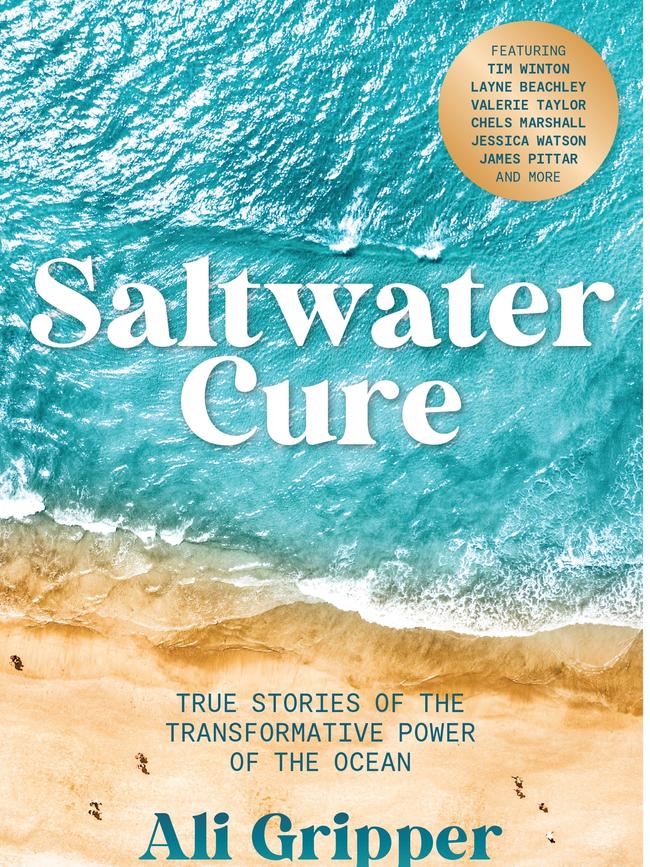
“It’s a state where you appreciate everything around you because your brain has slowed down and is actually taking it all in. And there’s nothing really to think about except being balanced on that board in the present moment.” His face softens at the recollection.
Soon, surfing began to transform Derek’s state of mind. “Your pleasure orientation changes. Instead of thinking about what drugs I needed that day, I started thinking about the swell, the tides, the temperature, any bluebottle alerts, and how I was going to get that fantastic sensation of catching a wave again.
“I started feeling normal again. The hours after I surfed were the best hours all week.
“It made me feel at peace, something I hadn’t felt for a long time.”
Today Derek is healthier than he was in his 20s, and the surfing has brought him a great gift: the ability to be closer with his son and daughter.
“Once I’d got off the psych meds and started surfing, my capacity as a human and a parent kept increasing. That’s really my main aim in life now: to get better for my family, to be a better dad than I have been.
“The ocean sort of feels like it’s holding me, healing me, making me a better person, and I wouldn’t have known that if I hadn’t met Rusty and started surfing.”
Edited extract from Saltwater Cure by Ali Gripper. Murdoch Books RRP $29.99.

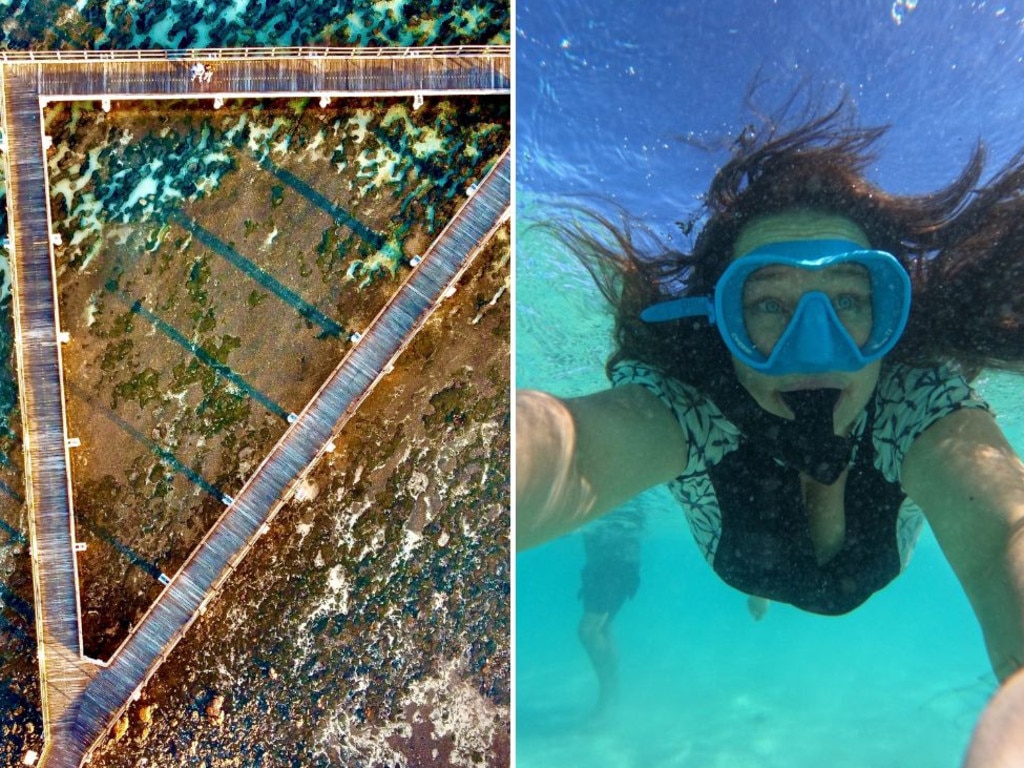


To join the conversation, please log in. Don't have an account? Register
Join the conversation, you are commenting as Logout